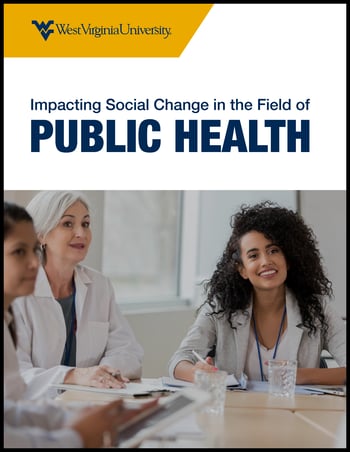
COVID-19 has had an unforeseeable impact on individuals and communities around the globe. In the wake of this global pandemic, it is more crucial, now than ever before, to prepare the next generation of public health experts to handle pandemics like the one we are experiencing today.
Getting a graduate degree in public health will enable you to address a wide range of public health issues, from pandemics to poor air quality to health policy and will give you the skills to improve the lives of others. Allow us to showcase West Virginia University's School of Public Health and detail why you should obtain a graduate degree in public health now.
What skills will you obtain by getting a graduate degree in public health?
The work done by our public health systems impacts the quality of life for everyone. New, complex public health challenges need innovative and motivated professionals to find solutions. Earning a graduate degree in public health prepares public health professionals to implement and enforce health and safety policies in workplaces, manage the operations of medical facilities, fight the climate crisis, and combat global pandemics.
Getting a graduate degree in public health will prepare and equip you to be the professional our public health system needs — now, and in the future.
How can I use my graduate degree in public health to combat pandemics?
The opportunities for influence in the public health sphere as a WVU graduate are expansive and diverse. Your employer could be an organization from the World Health Organization (WHO), National Institutes of Health (NIH), the National Environmental Health Association (NEHA), or the Agency for Toxic Substances and Disease Registry (ATSDR).
The recent months have shown us how important it is to have educated experts in the public health sphere to direct federal and public response to pandemics such as COVID-19. With a graduate degree in public health from WVU, there are endless ways you could help minimize the impact of this pandemic and any future pandemics we experience. Here are just a few career options for professionals who pursue a graduate degree in public health.
1. Become a Biostatistician
If you want to use your love of data and statistical analysis to improve pandemic response, look into becoming a biostatistician. Biostatisticians collect data on people, diseases, medicine, and various other public health issues, and analyze it in order to come up with solutions. As a biostatistician, you could quickly diagnose the signs and causes of a pandemic, and work with other public health officials to formulate the necessary responses to minimize spread and manage emergency care response.
2. Work in Healthcare Administration
Healthcare administrators oversee the operations of various health facilities, from doctor’s offices to hospitals. As a healthcare administrator, you would play a large role in developing and implementing a medical facility’s policies and procedures. This is an especially vital role when it comes to pandemic outbreaks, as quick and effective policy changes and adaptations are necessary to reduce spread and treat victims.
3. Research Vaccines
COVID-19 has shown us how crucial vaccine research and development is. Effective vaccine research requires that experts from various fields work together to develop, test, and distribute new vaccines. As a vaccine researcher, you will be on the front lines of pandemic outbreak response as part of a team that could save thousands of lives.
How will a graduate degree in public health prepare me to help others?
The public health field needs passionate, innovative researchers and thought leaders who are prepared to combat unpredictable public health issues, like COVID-19. Getting a graduate degree in one of WVU’s public health programs will enable you to do just that.
Department of Biostatistics: Biostatistics is the science of developing and applying statistical methods needed to tackle research problems in a variety of fields – especially public health and medicine. Once primarily focused on data analysis, the study of biostatistics has seen tremendous growth with the increasing importance of computational methods to facilitate data acquisition, modeling, and prediction. A graduate degree in public health with WVU’s Biostatistics department will equip you to be at the forefront of thought leadership in the areas of statistical/data analysis and development, which are crucial in identifying early stages of global pandemics and other public health threats.
Department of Epidemiology: Epidemiology is the basic science of public health. It began with studying outbreaks of infectious diseases but now encompasses the study of chronic diseases — such as diabetes, cardiovascular disease, and cancer — as well as injury and violence. An epidemiological understanding of health conditions is a crucial baseline component for mitigating negative health outcomes and increasing recovery. Studying public health with WVU’s Epidemiology department will help you become the expert others turn to in times of public health crisis. You’ll be able to identify areas of concern and propose solutions — skills that are invaluable in cases of pandemic outbreaks such as COVID-19.
Department of Health Policy, Management, and Leadership: The goal of Health Policy is to educate future leaders in policy and management, perform impactful research in public health policy and healthcare administration, and provide services to external stakeholders. Professionals in this field guide organizations and institutions in the delivery and management of healthcare. If you want to have a direct impact on how public health policy is created, carried out, enforced, and analyzed, WVU’s graduate degree in public health with the Department of Health Policy, Management, and Leadership could be a great fit for you!
Department of Occupational and Environmental Health Sciences: In both developed and developing nations, issues of environmental pollution arise from indoor air quality concerns, water quality, outdoor air, and waste products, as well as workplace exposures. Occupational and environmental health professionals keep populations safe and healthy, both at home and at work. Graduating with a master’s degree in public health with WVU’s Department of Occupational and Environmental Health Sciences will equip you to pave the way to a cleaner, healthier, more sustainable environment for generations to come.
Department of Social and Behavioral Sciences: Health disparities are shaped by behavioral and sociocultural factors. The study of Social and Behavioral Sciences in public health focuses on psychosocial, behavioral, community and societal influences on health and the development of interventions that eliminate barriers to health and healthcare access. The COVID-19 pandemic in particular has made us aware of the debilitating disparities present in our public health and healthcare systems. Studying public health with WVU’s Department of Social and Behavioral Sciences will enable you to minimize these disparities and give everyone equal access to a healthier, brighter future.
Why does R1 status set WVU apart?
West Virginia University is proud to be classified as an R1 institution. R1 universities are the best research universities in the U.S., where the majority of academic research is conducted. Having R1 status puts WVU into the “highest research activity” classification for doctoral universities.
Graduate students at Carnegie R1 institutions have the opportunity to engage in research at the forefront of their discipline. As public health becomes a more pressing issue than ever due to COVID-19, those wanting to enter the public health sphere need the top-of-the-line research opportunities only R1 institutions can provide.
Students at R1 universities also work with faculty who remain active in the discovery of knowledge and who bring the latest findings from their research and that of their colleagues into the classroom. The wealth of knowledge R1 university faculty has is unparalleled, so students who graduate with a degree from an R1 institution have the most current understanding of issues pertaining to their major field of study. In other words, R1 classified schools are up to date with the most recent findings and trends impacting that area; this means studying public health at WVU will make you a strong competitor in the postgraduate job search.
Connect with a community of changemakers in WVU’s School of Public Health:
COVID-19 is revolutionizing how we think about public health. Our globalized society needs individuals who can innovate new pandemic solutions that will save lives at home and around the world. If you want to make a difference in the public health sphere and help those impacted by pandemics, especially COVID-19, we encourage you to request more information or apply to West Virginia University today!
As an aspiring leader in the field of public health, it's important to choose the right graduate program for you. We invite you to explore our newest interactive resource — Impacting Social Change in the Field of Public Health!












